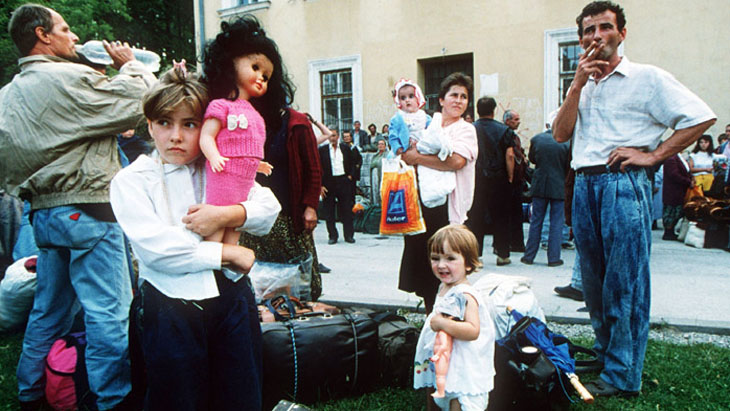Larissa’s two children have blue eyes, like hers. And although she has spent the last 25 years in in a village outside the city of El Mahalla El Kubra in Gharbia Governorate, the 50-year-old veiled European mother still struggles with Arabic.
She arrived in a fishing boat in 1992, during the war in Bosnia, with 30 other women in their early twenties who left their families in search of a safe life in Egypt. “I was only 22 years old when I left my village of Koserin. I joined the other women in the southern village of Klik, then we sailed to Italy.”
Their next choice was Egypt, Syria or Cyprus; legal and illegal migrations with promises to facilitate their lives in these countries. Larissa, later named Ibtissam, arrived in Damietta and there she and her friends were welcomed by Muslim women who facilitated their stay and provided proper accommodation. Later, the Bosnian women moved to Mansoura then Tanta.
Overcoming the language barrier
The Bosnian and Egyptian women communicated using sign language or some English words they knew, until Amina, a 30-year-old Bosnian woman who had studied Arabic in Cairo before the Bosnian war broke out and stayed there after she got married, helped out. The women held their meetings in an Islamic association in Tanta, and Amina began giving Arabic lessons to refugee women.
In less than a year, a number of imams and mosque preachers started coordinating a campaign to nominate potential husbands for the Bosnian women. According to Mustapha Jundi, a coordinator of the campaign in the early 1990s, the imams where picky and only selected flexible, religious, and preferably single men to marry the Bosnian women.
Once, a married man asked imam Sa’eed in El Mahalla El Kubra to give him a Bosnian woman to marry, but the imam taught him a lesson via loudspeakers in front of the worshippers in the mosque. The imams were aware that marrying a Bosnian woman, in such circumstances, was desirable because it was inexpensive and the women had no one and would settle for anything. It is not unlike the current situation with Syrian women.
“Of course, some marriages failed due to difficult communication, a woman’s desire to visit her country after the war, or poor economic conditions,” says Jundi. “Imam Sa’eed considered himself to be responsible for every young woman he helped get married. And if the husband started treating her badly, Imam Sa’eed sought to divorce her and provided her with a job in a clinic until the situation in Bosnia was stabile enough for her to return.”
Life between two cultures
Walaa, Larissa’s daughter, says her mother had concerns about living in a Christian country, which prompted her to leave Italy and migrate to Egypt. The mother did not fear the difference in language since she knew that Egypt was a Muslim country. Larissa met her husband shortly thereafter and married him in 1992.
Larissa’s husband was an English teacher who owned agricultural land and a small business. “Unlike other men, he did not treat me like a slave.” Larissa even went to Hajj four years ago. Although she does not speak Arabic fluently, she can read the Quran properly. She is a great cook and can make the best Baklava, according to her daughter Walaa. She also cooks meat using recipes unfamiliar to Walaa’s Egyptian aunts. Walaa says she knows a couple of Bosnian recipes and prefers Bosnian cuisine with grilled meats and pastries to Egyptian cuisine.
Thanks to her Egyptian aunts, Walaa speaks Arabic fluently. “I consider myself lucky because I am the product of two cultures,” she says. With her dark hair, blue eyes and European features, Wafaa is proud of her mother’s heritage. She can also name a few things in Bosnian and she might even learn the language one day, she says.
Larissa’s husband passed away two years ago. Her brothers-in-law now help her run her property and inheritance.

